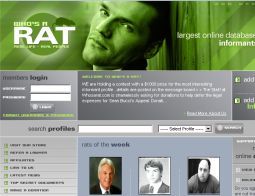By Jason Trahan
The Dallas Morning News
DALLAS — The identities of confidential informants and undercover agents are the most sought after information in the criminal underworld, and the most protected at all levels of law enforcement.
So it’s no wonder that Who’s a Rat — a Web site that specializes in making those names public — has aggravated authorities and could lead to a clamp-down by the federal courts over public access to some criminal case files.
 For a montly fee, the Web site whosarat.com gives users information on police informants and undercover officers. |
Last week, the policymaking arm of the nation’s federal judiciary stopped short of mandating that plea agreements no longer be made public, but recommended that all 94 U.S. District Courts take steps to seal information about whether a defendant has cooperated with authorities.
The decision came after plea agreements downloaded from the court’s nationwide Public Access to Court Electronic Records system, or PACER, began showing up on the Web site.
Local federal court officials have not decided what changes to make in the handling of plea agreements, “but we start from the presumption that it is a public record,” said Chief U.S. District Judge Sidney Fitzwater in Dallas.
A local decision is expected by June. Some plea agreements are sealed while some are not. Authorities point out that a plea deal is not necessarily proof that someone is an informant or plans to testify against another defendant.
Whosarat.com was started four years ago by Sean Bucci, a Massachusetts marijuana trafficker recently sentenced to 12 1/2 years in prison. He has turned the Web site over to family and friends to run.
The site seeks to expose people who “rat on a business associates, friends, or family members just to save themselves,” said Chris Brown, whosarat.com spokesman.
“Law enforcement isn’t bad, in our view,” he said. “It’s the tactics that they use.”
The site has survived because of free speech protections, he said. “The bottom line is we provide the forum. The members post.”
Other sites where people can rate law enforcement for their professionalism have been criticized for exposing officers to ridicule and harassment. But whosarat.com is alarming because authorities say it may endanger undercover informants.
Almost immediately after it went online in 2004, authorities began to worry that it would compromise cases, if not lives.
A 2006 Justice Department memo to the federal courts asking them to limit public access to plea agreements on PACER noted that some gang members have opened accounts.
“We are witnessing the rise of a new cottage industry engaged in republishing court filings about cooperators on websites such as www.whosarat .com for the clear purpose of witness intimidation, retaliation, and harassment,” the memo stated.
Whosarat.com’s database includes about 200 police officers and federal agents with Texas ties, and four from the Dallas area. One is listed as an FBI agent whose rank, according to the profile entry, is “punk.”
“It’s getting more and more difficult to do narcotics and vice operations with information like this available on the Internet,” said Dallas police Deputy Chief Julian Bernal, narcotics division commander. “The drug world is always trying to find out who’s a cop, who’s an informant.”
Whosarat.com lists 43 alleged informants from the Dallas area.
One is a man named Michael, who described the site as a “vindictive tool.” His full name and street are listed on the site, as well as his place of business. He didn’t want his full name published to protect his family. He has no criminal history.
Michael said that his name was put on the site by a man he described as a methamphetamine dealer who refused to stop trying to sell his wife drugs even while she was in rehab.
“He knew my wife had a problem,” Michael said. “I said, ‘If you don’t stop, I’m calling the cops.’ ”
The person listed as having created Michael’s profile did not return e-mails or phone calls.
“Any forum you run, you’re going to get people in there that are argumentative and want to stretch it to the boundaries,” Mr. Brown said when asked about that posting. “The more credible ones are the ones that have some sort of documentation.”
Documentation includes copies of a “rat’s” plea agreement. The fact that some people were using the plea agreements on whosarat.com prompted the Judicial Conference, which sets policy for the nation’s federal courts, to warn jurisdictions.
Last week, the conference recommended that local authorities and courts seal only portions of plea agreements that dealt with cooperation, while keeping other case files open to the public.
U.S. District Judge John Tunheim in Minnesota, who led the court’s study of the issue, said his committee found no evidence that anyone has been harmed by information tied to whosarat.com.
“We hear about potential threats from co-defendants, and sometimes people are charged later on for these threats,” he said.
HOW IT WORKS
— Operators say it is a resource for defense attorneys and their clients to keep from falling victim to crooked informants who, among other things, fabricate evidence against people for money.
— The searchable database contains 5,000 names, 400 purportedly of undercover police and more than 4,300 listed as confidential informants.
— The site’s information comes solely from its registered members. For a $7.99 trial membership, anyone can enter anyone they want into the database as an informant.
— Entries can be removed by the person who originally posted them, but only if they pay a $500 fee
Copyright 2008 The Dallas Morning News

